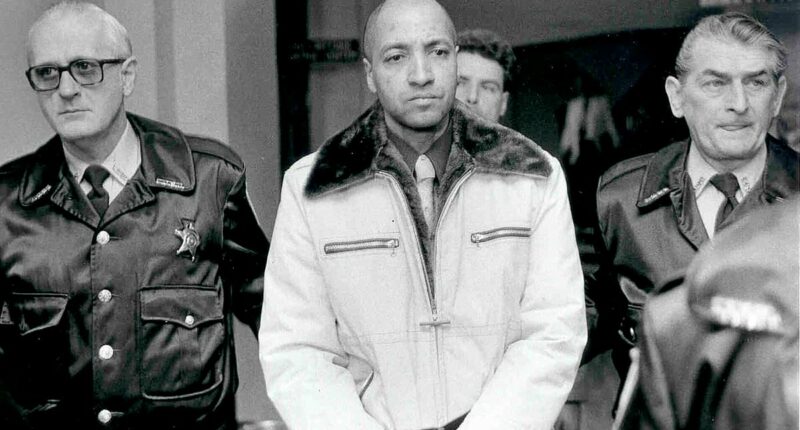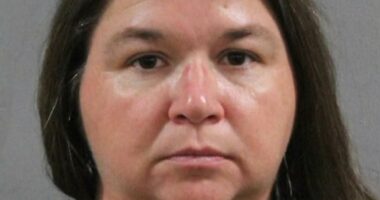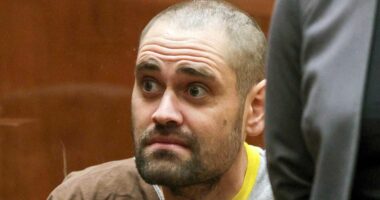Share this @internewscast.com
One of the most infamous mass murderers in U.S. history has passed away in prison from natural causes, having previously escaped the death penalty.
George Banks, aged 83, died on Sunday afternoon at Pennsylvania’s Phoenix state prison, according to the state Department of Corrections.
Dr. Janine Darby, the Montgomery County Coroner, confirmed that Banks succumbed to complications arising from renal neoplasm, a form of kidney cancer.
A former prison guard and Army veteran, Banks had been incarcerated since 1982, the year he used an AR-15 rifle to take the lives of 13 individuals, including five of his children.
On the early morning of September 25, 1982, Banks went on a deadly spree at his Wilkes-Barre, Pennsylvania home, killing three women and five children, four of whom were his own.
Banks later admitted that he committed the murders to spare his mixed-race children from the hardships of growing up in a world filled with racism.
But as he was fleeing the scene Banks noticed four teenagers walking to their car from a nearby friend’s house. He shot at two of them, killing one and critically injuring another.
From there Banks stole a car and traveled to the Heather Highlands Trailer Park where he shot his five-year-old son, the child’s mother, her seven-year-old nephew and her mother.

Mass murderer George Banks, 83, died on Sunday of complications from renal neoplasm, or kidney cancer
Following the bloodbath Banks traveled to his mother’s house where he admitted to killing his family, according to court documents.
But he remained holed up at a friend’s house until then-Luzerne County District Attorney Robert Gillespie convinced several local radio stations to broadcast reports saying all of the victims were going to live in a ploy to convince Banks his crimes were not as serious as he had thought, the Citizens’ Voice reports.
He then surrendered himself to the authorities, and it was later determined that Banks had been drinking and taking prescription drugs at a party late at night before using an AR-15 rifle to start the rampage at his home.
It was considered one of the worst mass murders in American history at the time.
Five of the victims were Banks’s own children, ages one to six, and four more were the mothers of his children.
Another victim was an 11-year-old child who often visited the family.
At an ensuing trial, Banks’s lawyers argued that he was mentally ill and haunted by delusions of race wars and racial abuse against his children, according to The New York Times.
Banks, whose father was black and whose mother was white, even testified at the trial that the shooting was ‘the culmination of 40 years of racist hatred’.

Banks was convicted of 12 counts of first-degree murder and one count of third-degree murder and was sentenced to death but this was overturned
But Banks also overruled his lawyer on strategic decisions, as he argued that prosecutors, the judge and the mayor of Wilkes-Barre were conspiring against him.
Banks also showed the jury gory pictures of his victims, even after his lawyer had successfully had the photos barred on the grounds that they were gruesome and prejudicial.
Jurors also heard from two 10-year-old stepbrothers, who described how they hid after Banks broke into their trailer that morning.
They said they peeked out from their hiding spots to see Banks kill their mother, their sister, a five-year-old half-brother who was the product of their mother’s relationship with Banks and their mother’s seven-year-old nephew.
Banks was ultimately found guilty of 12 counts of first-degree murder and one count of third-degree murder, and was sentenced to death.
It was not his first criminal conviction.
He committed his first violent crime after being discharged from the Army, shooting an unarmed tavern keeper during a robbery in 1961, according to the Times Leader.
Banks was sentenced to six to 15 years in prison and faced additional time after he briefly escaped in 1964, but was granted parole in 1969.

He was serving time at the Phoenix state prison in Pennsylvania at the time of his death
Then in 1969, then-Pennsylvania Governor Milton Shapp, a Democrat, commuted his sentence.
Banks worked as a prison guard outside of Harrisburg in the years that followed, until he was placed on leave shortly before the shootings and was urged to see a psychiatrist.
In the years since his conviction, Banks threatened to commit suicide, went on hunger strikes and refused medical and psychiatric treatment, according to the Death Penalty Information Center.
By 2001, Banks’s death sentence was overturned on appeal but later reinstated by the US Supreme Court in 2004.
Later that year, the Pennsylvania Supreme Court delayed Banks’s execution and ordered a mental health competency hearing, and in 2006, a judge ruled Banks was incompetent to face the death penalty.
The yearslong appeals process finally ended in 2011, when the Pennsylvania Supreme Court – citing evidence from Banks’s competency hearings, unanimously decided he would not be executed – leaving him with a sentence of life imprisonment.

















